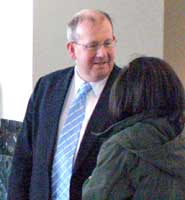Gideon award honors attorney for the poor
By
Larry Hales
Denver
Published May 31, 2007 9:24 PM
Attorney Mark Burton, member of the Colorado chapter of the National Lawyers
Guild, received the Gideon award from the Colorado Criminal Defense Bar this
May. The award states, “Presented to Mark Burton for remarkable effort to
fulfill the promise of Gideon V. Wainright and dedication of advocacy on behalf
of the poor.” The Gideon award is given for the top pro bono
attorney in the state and nomination for the award is anonymous.
|
Mark Burton in courthouse
corridor during
Shareef Aleem’s trial.
WW photos: Larry Hales
|
Burton, who has contributed articles to Workers World newspaper, has been a
lawyer since 1999, graduating from the University of Denver with a Juris
Doctorate. He was born of British parents here in Colorado and also
worked in the labor movement in Great Britain for six years, representing
hospital workers there.
Burton humbly represents many poor and indigent clients, many from oppressed
nationalities. Many of the cases he takes are the usual variety of poor
people of color being criminalized by the conditions of capitalist society and
the racist justice system, which are intrinsically political. The case which he
received the nomination for was overtly political.
|
Shareef Aleem and family.
|
That case involved Shareef Aleem, an anti-racist activist who was staring down
a minimum of four years in prison and maximum of 12 for a trumped up charge of
second degree aggravated assault on a cop.
(www.workers.org/2006/us/shareef-aleem-0308/)
Shareef Aleem’s first trial ended with a hung jury. Burton, along with
Tom Carberry, who received the Gideon award as well, represented him in the
retrial and won a tremendous victory for Aleem, his family, supporters and for
oppressed people around the Denver metropolitan area and the country.
The victory continues to resonate to this day, as Aleem, an important militant
fighter for the oppressed, continues to fight against the repressive state,
especially against the cops and their brutal treatment of workers, the poor and
oppressed.
The Gideon Award is a reference to Gideon v. Wainright, a case before the
Supreme Court in 1963, when the Supreme Court ruled unanimously that the sixth
and fourteenth amendments require that lawyers be provided for criminal
defendants who are unable to afford legal services. It was the latest of a
series of decisions involving similar circumstances.
In 1932, in Powell v. Alabama, the case of the Scottsboro Brothers, the racist
trial of nine Black youths, a rape story was fabricated by a white racist mob
after a scuffle between white and Black youths. The nine young Black men,
who were riding a boxcar to get to Memphis to look for jobs, had gotten into
the scuffle with the white youths after an affront by the white youths that led
to taunts, rock throwing, and finally an heroic deed by one of the Black youth,
who saved one of the whites from falling off the train. The trial was drawn out
for years, further highlighting the injustice of a system based on racism and
exploitation.
The 1932 case left it up to individual states to decide how and whether or not
counsel to the poor should be provided.
In 1942, in Betts v. Brady, the Supreme Court decided that the right to counsel
depended on each case.
The 1961 case of Clarence Earl Gideon of Panama City, Fla., involved a charge
of burglary. Gideon was being charged with breaking into a business and
stealing money from a vending machine. Gideon could not afford a lawyer. The
1963 Supreme Court decision that he must be provided one became the
benchmark.
While Supreme Court decisions have sometimes represented an important victory,
no court in the U.S. can be relied on to obtain justice. It is the
movement itself, the righteous indignation and mobilization of the masses that
buckles the system and forces the legal decisions, including the victories.
Progressive attorneys like Burton, who take on cases defending poor and
oppressed people, are the ones the movement counts on to argue for justice.
Their passionate arguments and determination, often out of the limelight, help
safeguard those who cannot afford counsel and are criminalized by the system.
Articles copyright 1995-2012 Workers World.
Verbatim copying and distribution of this entire article is permitted in any medium without royalty provided this notice is preserved.
Workers World, 55 W. 17 St., NY, NY 10011
Email:
[email protected]
Subscribe
[email protected]
Support independent news
DONATE


